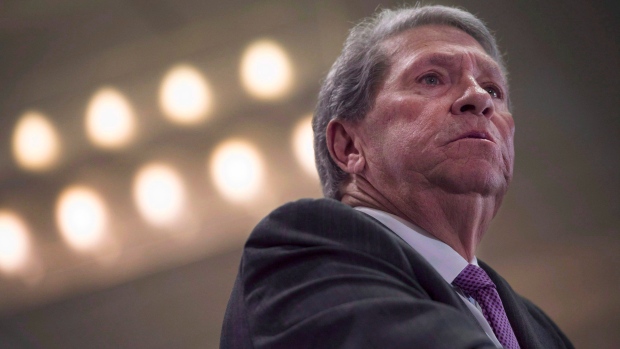Jan 22, 2019
Hunter Harrison's vision for streamlining trains is vindicated
, Bloomberg News

Hunter Harrison, a legend of the modern railroad industry, spent some of the final years of his life trying to boost the industry’s efficiency and reliability with one last megamerger. He failed, but today his vision for streamlining train operations is being vindicated—without megamergers.
As chief executive officer of Canadian Pacific Railway Ltd., Harrison approached CSX Corp. in 2014 about a possible takeover, but the deal never got off the ground. A year later he was back at it, beginning a hostile pursuit of CSX’s East Coast rival Norfolk Southern Corp. That fell apart five months later.
The mergers didn’t happen for many reasons, the biggest being that regulators didn’t want them to. Warren Buffett’s Berkshire Hathaway Inc. acquired Burlington Northern Santa Fe Corp. for US$36 billion in 2010, but there hasn’t been a major deal between two top North American railroads since the late 1990s. That was when Norfolk Southern and CSX split up Conrail Inc.’s assets and Canadian National Railway Co. acquired Illinois Central Corp.
In Harrison’s bid for Norfolk Southern, Canadian Pacific proposed to mitigate antitrust risk by temporarily housing its assets in a voting trust. Theoretically, this would have kept the two companies independent but would have allowed Norfolk Southern shareholders to get their payout before the takeover had been officially approved. Regulators took a dim view of the idea, and Harrison ended his quest after officials at the U.S. Army and the Department of Justice voiced opposition to the plan.

Among investors, questions lingered about whether Harrison would have been able to improve profits at CSX and Norfolk Southern to the extent he had at Canadian Pacific and Canadian National before that. He was known for his precision-scheduled railroading strategy, which was designed to reduce the number of people and cars and the amount of capital needed to run train operations. Critics said that operating ethos wouldn’t work as well at CSX or Norfolk Southern, whose circuitous routes cut across more difficult terrain.
They were wrong. In 2017 activist investor Mantle Ridge LP recruited Harrison to become CEO of CSX. The storied cost-cutter pushed too hard, too fast at CSX, earning the ire of customers, employees, and regulators. He died at 73 after less than a year in the job, and a protégé, James Foote, took over. To investors’ surprise, Foote has smoothed over the speed bumps created during Harrison’s tenure, and CSX has seen a dramatic improvement in profitability.
His success has prompted former naysayers at Norfolk Southern and Union Pacific Corp. to adopt Harrison’s blueprint, and it’s made his other former lieutenants a hot commodity. Jim Vena, who worked with him at Canadian National, is joining Union Pacific as its chief operating officer. The January announcement gave the railroad an almost US$9 billion pop in its market value in one day. Deal or no deal, the industry is remaking itself in Harrison’s image.
—Sutherland is a business columnist for Bloomberg Opinion




